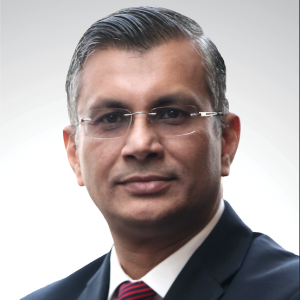OpenGov Asia is pleased to invite you to an exclusive OpenGovLive! Virtual Breakfast Insight aimed at imparting knowledge on effective business continuity plans and ensuring people are protected and business operations are running even during critical events.
Attendees
Countries
Hours of Content
Speakers
Sponsors
Business leaders have always been advocating preparing for “Black Swan” events.
A “Black Swan” is defined as an event having three characteristics: “rarity, extreme impact, and retrospective (though not prospective) predictability.”
Current pandemic and increasingly extreme weather situations all over the world are making the leaders rethink their operational resilience and business continuity strategies.
They are pondering if there is any guide to identify, getting ready for, and responding effectively and efficiently to critical events?
Is there any solution available that would automate and accelerate organisations’ operational response to critical events to keep people safe and businesses running?
It’s important to remember that business-threatening disasters can take many forms. It’s not always a destructive natural disaster (earthquakes, floods, pandemics). In fact, it’s far more common to experience disaster from “the inside” – events that hurt your productivity or affect your IT infrastructure and are just as disruptive to your operations.
Incidents like cyberattacks, data loss, malware and viruses, hardware and software failures, internet, and network disruptions are some of the “inside events” that can hurt your business operations.
It would require an integrated approach to aggregate risk data, locate people and assets under threat, initiate action and manage incidents, and analyse after-action performance.
An Integrated and Unsiloed Approach to Improve Operational Resilience
Organisations are investing significant resources in sophisticated controls to protect people, brands, and assets from multiple threats. These disruptive incidents (ranging from extreme weather to IT outages) increasingly lead to operational losses, brand damage, and
concerns for health and safety.
Despite the investment, companies struggle to optimise their critical event management (CEM) operation, slowing down response time and creating potentially life-threatening confusion. As a result, companies are turning toward continuous-resolution and a unified approach to critical event management that links security and business operations.
Organisations with a unified approach will see a return on their investment in the form of reduced mean time to identify, know, fix, and resolve events — the real measures of a successful critical event management strategy.
Companies that work to integrate their approach across silos also stand a chance of a significant reduction in the impact that critical events have on safety, reputation, and revenue.
Technology will help them to be prepared, provide them with the ability to monitor risk intelligence, and give them the means of communicating with employees, wherever they are and protect them in the process.
Managing Critical Events – Efficient, Automated and Collaborative Process
In an increasingly uncertain world, there is a need for companies to increasingly taking a unified approach (also known as the cross-functional fusion center approach) to combat the widespread damage of critical events.
These organisations need to work across business units, combining internal resources, technology, and business services, such that operations to detect and manage multiple critical events beyond strictly securing facilities.
Businesses today will likely suffer multiple critical events every year, resulting in millions of dollars in unexpected costs, operational disruption, and real threats to their workforce, customers, or suppliers.
Managing multiple threats, therefore, has become a new operational imperative. To anticipate, manage, and curb disruptions to business continuity, leading COOs are embracing a unified approach to CEM, enabled by tested, purpose-built technology.
Given the growth of critical event risks, it is no longer an option for one job function to reactively address this risk or rely on their C-suite peers, such as the Chief Security Officer, to be responsible for managing this risk. Effective business continuity demands that the entire organisation right from COOs to Chief Security Officer (CSO), Chief Information Security Officer (CISO), Chief Information Officer (CIO), Chief Risk Officer (CRO), and their Chief People Officer (CPO) come together to make it as an organisational imperative.



OpenGov Asia releases new digital content daily on trending topics within technology and the public sector. Join our newsletter to have weekly digests of our content conveniently sent to your email address.




I have consistently found OpenGov Asia sessions to be lively, stimulating and attended by a good variety of high-quality delegates
Go-Ahead Singapore

This session was perfectly pitched to busy executives. I really enjoy how the sessions are participative and fast paced
UNSW Sydney

It was a well-managed event both from content and time management perspective
Olam International Limited
© 2024 OpenGov Asia – CIO Network Pte Ltd.
Everbridge, Inc. (NASDAQ: EVBG) is a global software company that provides enterprise software applications that automate and accelerate organizations’ operational response to critical events in order to keep people safe and businesses running. . The company’s platform sent over 3.5 billion messages in 2019 and offers the ability to reach over 550 million people in more than 200 countries and territories, including the entire mobile populations on a country-wide scale in Australia, Greece, Iceland, the Netherlands, Peru, Singapore, Sweden, and a number of the largest states in India
Qlik’s vision is a data-literate world, where everyone can use data and analytics to improve decision-making and solve their most challenging problems. A private company, Qlik offers real-time data integration and analytics solutions, powered by Qlik Cloud, to close the gaps between data, insights and action. By transforming data into Active Intelligence, businesses can drive better decisions, improve revenue and profitability, and optimize customer relationships. Qlik serves more than 38,000 active customers in over 100 countries.
CTC Global Singapore, a premier end-to-end IT solutions provider, is a fully owned subsidiary of ITOCHU Techno-Solutions Corporation (CTC) and ITOCHU Corporation.
Since 1972, CTC has established itself as one of the country’s top IT solutions providers. With 50 years of experience, headed by an experienced management team and staffed by over 200 qualified IT professionals, we support organizations with integrated IT solutions expertise in Autonomous IT, Cyber Security, Digital Transformation, Enterprise Cloud Infrastructure, Workplace Modernization and Professional Services.
Well-known for our strengths in system integration and consultation, CTC Global proves to be the preferred IT outsourcing destination for organizations all over Singapore today.
Planview has one mission: to build the future of connected work. Our solutions enable organizations to connect the business from ideas to impact, empowering companies to accelerate the achievement of what matters most. Planview’s full spectrum of Portfolio Management and Work Management solutions creates an organizational focus on the strategic outcomes that matter and empowers teams to deliver their best work, no matter how they work. The comprehensive Planview platform and enterprise success model enables customers to deliver innovative, competitive products, services, and customer experiences. Headquartered in Austin, Texas, with locations around the world, Planview has more than 1,300 employees supporting 4,500 customers and 2.6 million users worldwide. For more information, visit www.planview.com.
SIRIM is a premier industrial research and technology organisation in Malaysia, wholly-owned by the Minister of Finance Incorporated. With over forty years of experience and expertise, SIRIM is mandated as the machinery for research and technology development, and the national champion of quality. SIRIM has always played a major role in the development of the country’s private sector. By tapping into our expertise and knowledge base, we focus on developing new technologies and improvements in the manufacturing, technology and services sectors. We nurture Small Medium Enterprises (SME) growth with solutions for technology penetration and upgrading, making it an ideal technology partner for SMEs.
HashiCorp provides infrastructure automation software for multi-cloud environments, enabling enterprises to unlock a common cloud operating model to provision, secure, connect, and run any application on any infrastructure. HashiCorp tools allow organizations to deliver applications faster by helping enterprises transition from manual processes and ITIL practices to self-service automation and DevOps practices.
IBM is a leading global hybrid cloud and AI, and business services provider. We help clients in more than 175 countries capitalize on insights from their data, streamline business processes, reduce costs and gain the competitive edge in their industries. Nearly 3,000 government and corporate entities in critical infrastructure areas such as financial services, telecommunications and healthcare rely on IBM’s hybrid cloud platform and Red Hat OpenShift to affect their digital transformations quickly, efficiently and securely. IBM’s breakthrough innovations in AI, quantum computing, industry-specific cloud solutions and business services deliver open and flexible options to our clients. All of this is backed by IBM’s legendary commitment to trust, transparency, responsibility, inclusivity and service.